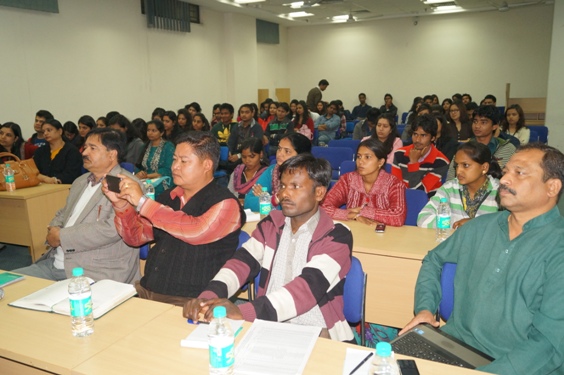28 Feb 2014|Noida | Amity University Campus, Sector-125 Noida
Amity institute for Social Sciences organises Training Workshop on “Field Projects: Opportunities and Challenges in Social Laboratory”

Amity institute for Social Sciences organized a Training Workshop on “Field Projects: Opportunities and Challenges in Social Laboratory” on 28th February, 2014 which was conducted by the Country Director Ms. Geeta Malhotra of the reputed Trust- Read India along with 17 participants from READ-India Centres across the country. Prof. Nirupama Prakash, Director AISS welcomed the resource persons, AISS students and faculty and highlighted the importance of conducting field research in various domains of Social Sciences.
Read India is an extension of Read Global. It expanded to India in 2007 to empower women and marginalized groups, and create educational and economic opportunities in rural areas. Areas of work include states of Delhi, Haryana, Maharashtra, Manipur, Karnataka, Rajasthan, Uttar Pradesh, and West Bengal. READ Centers focus on giving women the chance to learn to read, teaching people about their rights, and giving rural villagers skills to earn a living. Sustaining enterprises range from a gooseberry processing facility, to sewing and weaving businesses. READ India is home one of our all-women-operated centers, as well as several women’s self-help groups.
The workshop was conducted with as many as 17 people cited their personal accounts and experiences as to how their lives changed on their association with READ.
The examples ranged from child education to women empowerment and in some cases also setting up enterprises to achieve a sustainable living and development. An example cited by Poonam, who looks after the vocational training of women, sumed up all the activities that READ endorses. She cited the example of a woman Kamlesh, who was living a troubled married life. Many a times she tried to learn sewing at the center but somehow she couldn’t sustain through the course. This was majorly due to the marital discord and unhappy family back home. She often was subjected to domestic violence and ultimately one day she packed her bags and left her home for the center. But at the center she was discouraged for taking this action and all the more discourage for going to police. Rather the idea at the center was to find the solution. Since Kamlesh was uneducated and didn’t know sewing as well, she felt helpless. But a chance thought on behalf of a certain center member, her life changed!
This is a clear example of the women empowerment, economic growth of women, children welfare and most importantly spreading awareness about the rights each individual has. This is actively done by the READ organization.
During the second half of the Workshop, students were explained the process and ways through which the organizations tries to reach through people. These processes can be summed up in a Logical Framework Analysis, which is a part of the curriculum of all students;
i.e. Activitiesà Process Measuresà Short term OutcomesàIntermediate and Long term Outcomes.
Be it opening a library or any other Center, the organization follows certain steps which briefly are:
· Process of realizing the Theories of Change
· Formulating Logical Models based on the theories- surveys and questionnaires are formulated at this stage
· Evaluation of the Plan
· Instruments overview- such as surveys and questionnaires are looked into carefully
· Funding is sort for
· Core Outcomes are adhered to
· Lastly, Mitigating the challenges- this is a future practice, i.e. any future obstacles are dealt with a year before instead of waiting for the last moment
Discussion was followed by the showcasing of two movies on women empowerment as depicted by Hetashi, a polio patient and children education which depicted the science fair held in Geejgarh (Rajasthan). The Workshop was formally ended by a vote of thanks given by Dr. Shalini Saxena.